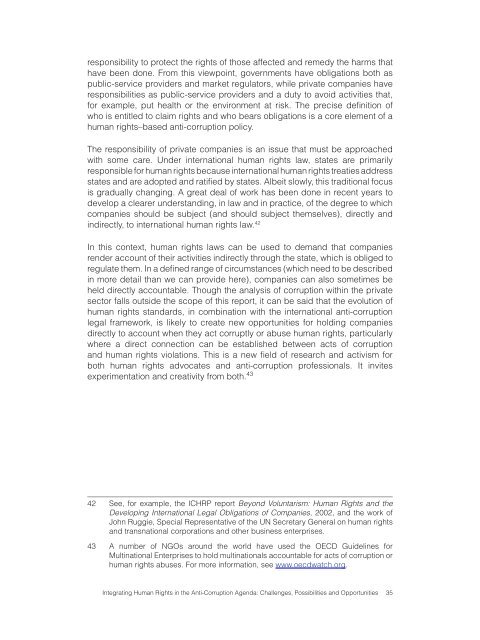Integrating Human Rights in the Anti-Corruption Agenda - The ICHRP
Integrating Human Rights in the Anti-Corruption Agenda - The ICHRP
Integrating Human Rights in the Anti-Corruption Agenda - The ICHRP
You also want an ePaper? Increase the reach of your titles
YUMPU automatically turns print PDFs into web optimized ePapers that Google loves.
esponsibility to protect <strong>the</strong> rights of those affected and remedy <strong>the</strong> harms that<br />
have been done. From this viewpo<strong>in</strong>t, governments have obligations both as<br />
public-service providers and market regulators, while private companies have<br />
responsibilities as public-service providers and a duty to avoid activities that,<br />
for example, put health or <strong>the</strong> environment at risk. <strong>The</strong> precise def<strong>in</strong>ition of<br />
who is entitled to claim rights and who bears obligations is a core element of a<br />
human rights–based anti-corruption policy.<br />
<strong>The</strong> responsibility of private companies is an issue that must be approached<br />
with some care. Under <strong>in</strong>ternational human rights law, states are primarily<br />
responsible for human rights because <strong>in</strong>ternational human rights treaties address<br />
states and are adopted and ratified by states. Albeit slowly, this traditional focus<br />
is gradually chang<strong>in</strong>g. A great deal of work has been done <strong>in</strong> recent years to<br />
develop a clearer understand<strong>in</strong>g, <strong>in</strong> law and <strong>in</strong> practice, of <strong>the</strong> degree to which<br />
companies should be subject (and should subject <strong>the</strong>mselves), directly and<br />
<strong>in</strong>directly, to <strong>in</strong>ternational human rights law. 42<br />
In this context, human rights laws can be used to demand that companies<br />
render account of <strong>the</strong>ir activities <strong>in</strong>directly through <strong>the</strong> state, which is obliged to<br />
regulate <strong>the</strong>m. In a def<strong>in</strong>ed range of circumstances (which need to be described<br />
<strong>in</strong> more detail than we can provide here), companies can also sometimes be<br />
held directly accountable. Though <strong>the</strong> analysis of corruption with<strong>in</strong> <strong>the</strong> private<br />
sector falls outside <strong>the</strong> scope of this report, it can be said that <strong>the</strong> evolution of<br />
human rights standards, <strong>in</strong> comb<strong>in</strong>ation with <strong>the</strong> <strong>in</strong>ternational anti-corruption<br />
legal framework, is likely to create new opportunities for hold<strong>in</strong>g companies<br />
directly to account when <strong>the</strong>y act corruptly or abuse human rights, particularly<br />
where a direct connection can be established between acts of corruption<br />
and human rights violations. This is a new field of research and activism for<br />
both human rights advocates and anti-corruption professionals. It <strong>in</strong>vites<br />
experimentation and creativity from both. 43<br />
42 See, for example, <strong>the</strong> <strong>ICHRP</strong> report Beyond Voluntarism: <strong>Human</strong> <strong>Rights</strong> and <strong>the</strong><br />
Develop<strong>in</strong>g International Legal Obligations of Companies, 2002, and <strong>the</strong> work of<br />
John Ruggie, Special Representative of <strong>the</strong> UN Secretary General on human rights<br />
and transnational corporations and o<strong>the</strong>r bus<strong>in</strong>ess enterprises.<br />
43 A number of NGOs around <strong>the</strong> world have used <strong>the</strong> OECD Guidel<strong>in</strong>es for<br />
Mult<strong>in</strong>ational Enterprises to hold mult<strong>in</strong>ationals accountable for acts of corruption or<br />
human rights abuses. For more <strong>in</strong>formation, see www.oecdwatch.org.<br />
<strong>Integrat<strong>in</strong>g</strong> <strong>Human</strong> <strong>Rights</strong> <strong>in</strong> <strong>the</strong> <strong>Anti</strong>-<strong>Corruption</strong> <strong>Agenda</strong>: Challenges, Possibilities and Opportunities 35

















